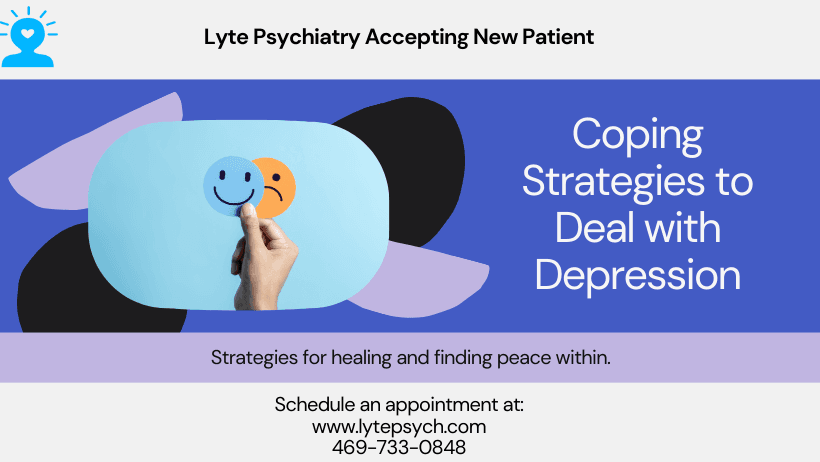Tue May 21 2024
Understanding Depression: Strategies for Coping and Healing A Comprehensive Guide from Lyte Psychiatry (Best Adults and Adolescents Therapists and Psychiatrists Near You), Affordable Therapists and Psychiatrists Near You, Dallas, Fort Worth, TX

Understanding Depression: Strategies for Coping and Healing A Comprehensive Guide from Lyte Psychiatry (Affordable Therapists and Psychiatrists Near You)
Depression has become increasingly prevalent, affecting millions of people worldwide. Coping with depression can be challenging, but it's essential to remember that healing is possible. By understanding depression and implementing effective coping strategies, individuals can get around their way toward recovery and reclaim their sense of well-being.
Understanding Depression
Depression is more than just feeling sad; it's a complex mental health condition that can have a profound impact on every aspect of a person's life. It's characterized by persistent feelings of sadness, hopelessness, and a loss of interest in activities once enjoyed. Understanding the underlying causes and symptoms of depression is crucial for effective management and treatment.
Causes of Depression
Depression can stem from a variety of factors, including:
Biological Factors: Imbalances in brain chemicals, genetics, or hormonal changes can contribute to depression.
Psychological Factors: Trauma, stress, or negative thought patterns can increase the risk of developing depression.
Environmental Factors: Certain life events, such as loss, financial difficulties, or chronic illness, can trigger depression.
Symptoms of Depression
Recognizing the symptoms of depression is the first step toward seeking help. Common symptoms include:
Loss of interest in activities
Sleep disturbances
Difficulty concentrating
Thoughts of death or suicide
Daily Coping Strategies to Deal with Depression
1. Getting regular exercise to boost mood and reduce stress
Eating a balanced diet rich in fruits, vegetables, and whole grains
Prioritizing adequate sleep and establishing a consistent sleep routine
Engaging in activities that bring joy and fulfillment
2. Challenge Negative Thoughts
Negative thought patterns can exacerbate depression symptoms. Learning to challenge and reframe negative thoughts can help shift perspective and promote a more positive outlook. Cognitive-behavioral therapy (CBT) techniques are particularly effective in identifying and changing negative thinking patterns.
3. Establish Routine and Structure
Creating a daily routine can provide a sense of stability and predictability, which can be comforting for individuals struggling with depression. Set realistic goals and prioritize tasks to avoid feeling overwhelmed.
4. Practice Mindfulness and Relaxation Techniques
Mindfulness practices, such as meditation, deep breathing exercises, or yoga, can help reduce stress and promote relaxation. Incorporating these techniques into your daily routine can improve mood and overall well-being.
5. Stay Connected
Maintaining social connections, even when it feels challenging, is essential for combating feelings of isolation and loneliness. Make an effort to reach out to loved ones regularly, whether through phone calls, video chats, or in-person interactions.
Seek Professional Help with Lyte Psychiatry (Best Adults and Adolescents Near You)
By understanding depression and implementing effective coping strategies, individuals can take control of their mental health and work towards healing. Seeking professional help, building a support system, practicing self-care, challenging negative thoughts, establishing routine, and staying connected are all valuable tools in the journey toward healing from depression.
To Schedule an appointment. Click Here
To see our services. Click Here
Call us if you have questions at 469-733-0848
FAQ
Q: What are the first steps to take if I think I might have depression?
A: If you suspect you might be experiencing symptoms of depression, the first step is to speak with a healthcare professional. They can provide a diagnosis and discuss treatment options. It's also helpful to reach out to trusted friends or family members for support.
Q: Can depression only be treated with medication?
A: No, depression can be treated with a variety of methods, not just medication. Psychotherapy, such as cognitive-behavioral therapy (CBT), lifestyle adjustments, and support groups, are also effective. Treatment plans are usually tailored to each individual's needs.
Q: What should I do if someone I know is showing signs of depression?
A: Encourage them to seek professional help and express your willingness to support them. Be empathetic and listen to their experiences without judgment. Offer to help them find mental health services or accompany them to a consultation.
Q: Is it possible to completely recover from depression?
A: Yes, many people fully recover from depression. Recovery can be a gradual process, and it might involve various treatments and support systems. It's important for individuals to work closely with their healthcare providers to find the best approach for their specific needs.
Q: How can I maintain my mental health after recovering from depression?
A: Maintaining mental health after recovery involves continued practice of healthy lifestyle habits, regular monitoring of your mental state, and possibly ongoing therapy. It’s also important to maintain a support network and recognize early signs of any potential relapse.
Q: How can Lyte Psychiatry help with depression?
A: Lyte Psychiatry offers access to affordable therapists and psychiatrists who specialize in treating depression. We provide personalized treatment plans, including therapy and medication management, tailored to each individual’s needs.